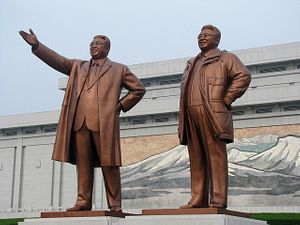Amidst talk of a charm offensive from North Korea, its recent denial of political prison camps at the UN and Council on Foreign Relations was a stark reminder of its true colors. These camps, extensively documented in a UN report issued last February, give testimony to the North’s perpetual charmless offensive: its blatant disregard for human rights and ongoing pursuit of nuclear immunity for these crimes. Many basic facts about North Korea remain elusive, but last February’s UN report on human rights in North Korea makes one thing crystal clear: In North Korea, poverty and hunger politics are still a deliberate state policy.
Leader Kim Jong-un’s purchasing history is revealing. While malnutrition, hunger, and starvation plague the general population, Kim builds ostentatious water and theme parks, dolphinariums, and ski resorts. In addition to these recent high-profile public attractions, the regime still spends plenty on old favorites. In 2012, North Korea spent $1.3 billion on its ballistic missile program and more than $645 million on luxury goods for the regime’s elites.
As the UN report points out, most North Koreans don’t have enough to eat. Cruising down a lazy river or the ski slopes on a Sunday afternoon simply isn’t an option. According to another UN report, in 2013, 84 percent of North Korean households had “borderline” or “poor” levels of food consumption.
To be clear, North Korea is poor because of the regime’s hostile internal policies. Through its caste system, songbun, the state controls each individual’s access to employment, education, health care, housing, and food based on their perceived loyalty to the Kim regime. Songbun divides North Koreans into three categories: the loyal, wavering, and hostile classes – which make up 28 percent (6.3 million), 45 percent (10.5 million), and 27 percent (6.3 million) of the population, respectively.
As these numbers indicate, songbun greatly simplifies the task of governance. To stay in power, the Kim regime just needs to keep less than a third of the population satiated and comfortable enough to fear the loss of their privileges. North Korea’s systematic discrimination against the remaining two-thirds of the population is well-documented.
For example, in 1998, following a devastating famine that killed between 600,000 and 2.5 million people, the World Food Program and European Union reported that 32 percent of North Korean children showed no evidence of malnutrition, 62 percent suffered from moderate malnutrition, and 16 percent suffered from severe acute malnutrition. Not coincidentally, these percentages roughly mirror the breakdown of society into the loyal, wavering, and hostile classes. As the UN report confirms, “The State has practiced discrimination with regards to access to and distribution of food based on the songbun system.”
Intentional deprivation of food is just the tip of the iceberg. The UN report also documents widespread, ongoing atrocities. The conditions in the political prisoner concentration camps that harken back to World War II prompted Michael Kirby, the commission chair, to remark, “We can’t say we didn’t know.” If policymakers in the U.S. and elsewhere choose to do nothing, however, they reserve the right to say they did not care. That would be a collective ignominy, both because we know the scale of atrocities that North Korea intentionally inflicts on its people, and because there are low-risk, potentially high-reward options to change this tragedy.
The current U.S. policy of strategic patience, which amounts to a policy of non-interference, is not one of them. Waiting for voluntary better behavior from the Kim regime is like waiting for Godot. It is time for a proactive rather than a reactive strategy.
A key piece of this strategy currently sits in Congress. The passage of House Resolution 1771, the most robust North Korea sanctions package to date, would accomplish two very important things. First, it would restrict the trade of materials and technology for North Korea’s nuclear and missile programs. Second, it would cut off exports of luxury goods to North Korea. The former grants legitimacy and security to the regime; the latter buys it allegiance. Paired with a strategy of increasing the flow of outside information into North Korea, these levers could enhance Washington’s negotiating position on North Korea’s unparalleled human rights violations and menacing nuclear weapons programs.
It is often feared that sanctions have a harmful effect on ordinary citizens. But targeted financial sanctions would have only a marginal impact on the North Korean people. Since the collapse of the public distribution system in the 1990s, the majority of North Koreans have relied on informal markets as their primary source of food and income. Ordinary North Koreans are not on the receiving end of ballistic missile systems or S-class Mercedes.
Actions taken against the Kim regime should be supplemented by actions taken for its people. Working through the WFP and FAO, the international community should provide food aid to North Korea in abundance, on one firm and unyielding condition: The regime enables them to closely monitor its proper distribution. Its refusal to do so would justify the use of sanctions and information flows to change the regime’s calculations.
To be clear, sanctions target North Korea’s profligacy and disregard for human life. They do not purport to induce regime collapse, although to instill such fears in the Kim regime would enhance U.S. bargaining power. Tightening sanctions and increasing information flows are two low-cost, potentially high-reward ways for the U.S. to increase its negotiating power to disarm the regime and improve the lives of ordinary North Koreans. The choice is simple. The U.S. can do something to address Pyongyang’s growing threat, or it can do nothing and live with the consequences. But along with the rest of the international community, it can’t say it didn’t know.
Zach Przystup received a master’s degree in international relations from The Fletcher School of Law and Diplomacy at Tufts University, where he studied U.S. Foreign Policy and Pacific Asia. He is now the Assistant Director for Global Executive and Diplomatic Education at The Fletcher School.

































